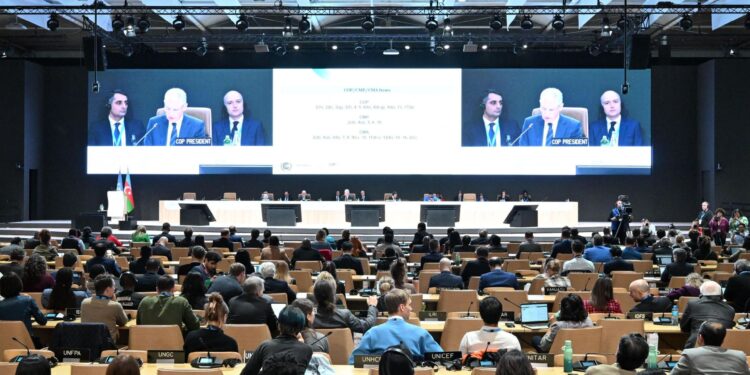Yesterday, Saturday, US President Joe Biden praised the COP29 agreement as an “important step” in combating climate warming, at a time when the African Group criticized the financial commitment in this agreement, describing it as “too weak and too late.”
Today, Sunday, at the United Nations Climate Change Summit (COP29) in Baku, the capital of Azerbaijan, the countries of the world agreed on an annual financing target of $300 billion to help the poorest countries confront the effects of climate change.
The agreement, which came after two weeks of arduous negotiations, aims to provide impetus to international efforts aimed at reducing global warming in a year expected to be the hottest on record.
The US President praised the agreement as an “important step” in combating climate warming, pledging that his country would continue its work despite the position of his successor, Donald Trump, who doubted climate change.
“Some may seek to deny or delay the ongoing clean energy revolution in America and around the world,” Biden said, but “no one can reverse” this path.
Commissioner responsible for climate negotiations Wopke Hoekstra also hailed the “beginning of a new era” for climate finance. He said, “We worked hard with all of you to ensure that more money was on the table. We are tripling the $100 billion goal, and we believe this goal is ambitious. It is necessary, realistic, and achievable.”
Simon Steele, Executive Secretary of the United Nations Framework Convention on Climate Change, also hailed the outcome as an insurance policy for humanity despite the arduous negotiations. “It has been a difficult journey, but we have reached an agreement. This agreement will continue to grow the clean energy boom and protect billions of lives,” he said.
A foundation to build on
For his part, United Nations Secretary-General António Guterres considered that the agreement constitutes a “foundation” on which to build. He said in a statement, “I was hoping to reach a more ambitious result… in order to confront the great challenge we face,” calling on “governments to consider this agreement as a basis to continue building” on it.
British Energy Minister Ed Miliband, in turn, welcomed the agreement, describing it as a “crucial last-minute agreement for the climate,” and said, “This is not everything we or others wanted, but it is a step forward for all of us.”
As for French Minister of Environmental Transition, Agnes Pannier-Ronache, she expressed her regret that the agreement reached on Sunday in Azerbaijan was “disappointing” and “not up to the challenges.”
Developing countries criticize
On the other hand, the agreement sparked a state of frustration among developing countries that benefited from the agreement, describing it as completely insufficient.
The chief negotiator of the African Group, Ali Mohamed, expressed his regret about the “very weak and very late” financial commitment in this agreement, and said that “the commitment to mobilize more financing by 2035 is very weak, very late, and very vague in terms of its implementation.”
He added, “We leave Baku knowing that we have made progress in some areas, but what we have achieved is far from what we had hoped for.”
Evans Ngiwa of Malawi, who chairs the groups of least developed countries, also said on Sunday that the agreement on climate financing in Baku (COP29) “is not ambitious enough.” He added in the plenary session, “This goal is not what we had hoped for after years of discussions.”
The representative of the Indian delegation, Chandni Raina, said at the closing session of the summit, minutes after signing the agreement, “I regret to say that this document is nothing more than an optical illusion. In our opinion, it will not address the enormity of the challenge that we all face.”



